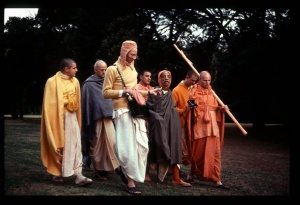CC Adi 13.92 (1975)

A.C. Bhaktivedanta Swami Prabhupada
Below is the 1996 edition text, ready to be substituted with the 1975 one using the compile form.
TEXT 92
- eta jāni’ rāhu kaila candrera grahaṇa
- ‘kṛṣṇa’ ‘kṛṣṇa’ ‘hari’ nāme bhāse tri-bhuvana
SYNONYMS
eta jāni’—knowing all this; rāhu—the zodiac figure Rāhu; kaila—attempted; candrera—of the moon; grahaṇa—eclipse; kṛṣṇa kṛṣṇa—the holy name of Kṛṣṇa; hari—the holy name of Hari; nāme—the names; bhāse—inundated; tri-bhuvana—the three worlds.
TRANSLATION
Considering this, Rāhu, the black planet, covered the full moon, and immediately vibrations of “Kṛṣṇa! Kṛṣṇa! Hari!” inundated the three worlds.
PURPORT
According to the Jyotir-veda, a lunar eclipse takes place when the Rāhu planet comes in front of the full moon. It is customary in India that all the followers of the Vedic scriptures bathe in the Ganges or the sea as soon as there is a lunar or solar eclipse. All strict followers of the Vedic religion stand up in the water throughout the whole period of the eclipse and chant the Hare Kṛṣṇa mahā-mantra. At the time of the birth of Lord Caitanya Mahāprabhu, such a lunar eclipse took place, and naturally all the people standing in the water were chanting Hare Kṛṣṇa, Hare Kṛṣṇa, Kṛṣṇa Kṛṣṇa, Hare Hare/ Hare Rāma, Hare Rāma, Rāma Rāma, Hare Hare.